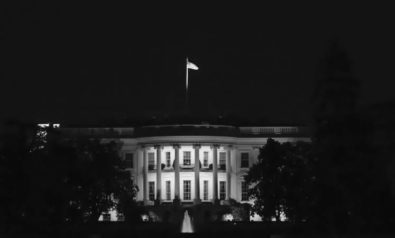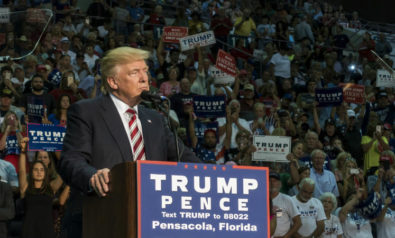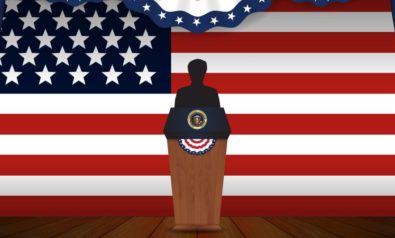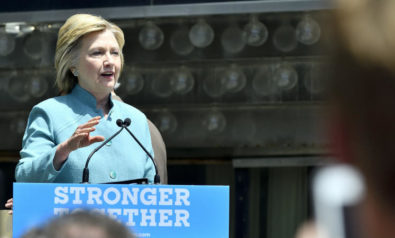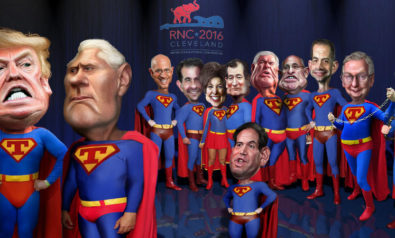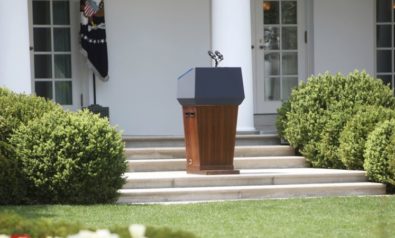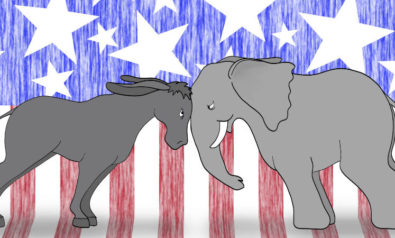America will come together again, but the process will not be an easy one.
Social, economic and political threats as daunting as those that made headlines in the 2016 presidential campaign would almost surely have started a bloody revolution if they had crashed into the public consciousness a century and a half ago. So much verbal vitriol was thrown by Donald Trump that millions were much relieved when, in his acceptance speech as president-elect, he emphasized the need for conciliation and national unity. One sincerely hopes that he can put aside the poisonous persona of his campaign, and that his presidency will become a successful contributor to the American dream.
On November 9, the National Guard did not need to be called out, but months before the election, it was clear that irate people in the lower- and middle-income brackets, the unemployed and the veterans had spoken. They had done so, loudly, by voting their enthusiasm for an angry-sounding and explosive showman who whipped up their wrath with his campaigns. It is now starkly plain that their anger was shared by a large segment of the population whose discontent had been glossed over or ignored by the usual political movers and shakers. Which was what they had done, in large part, until the campaign rhetoric woke them up. Now, the public have demanded more radical change than President Barack Obama could offer.
America is Angry
“The 2016 campaign has brought to the surface the despair and rage of poor and middle-class Americans who say their government has done little to ease the burdens that recession, technological change, foreign competition and war have heaped on their families,” The New York Times editorial board declared.
Trump’s successful campaign forced the more affluent parts of America to recognize the plight of these poor and middle-class families, and from the tenor of his speeches those in the war zones of American poverty could imagine that they could gain a powerful advocate who would diligently work for them.
Clearly not enough of Washington’s influential elite took much interest when, a year ago, the Pew Research Center reported that among 6,000 Americans surveyed, “just 19% say they can trust the government always or most of the time, among the lowest levels in the past half-century.” That’s less than one in five.
Apparently, the government still didn’t get the message that public trust had been moving downhill since the onset of the Iraq War, when nearly 50%—itself hardly an encouraging percentage—expressed that much trust in government. It is a public disgrace that partisan strife in Congress time and time again contributed to this mistrust while using up time that was sorely needed to solve greater problems.
Ironically, Trump’s campaign benefited from public distrust of established government—and now he and his party will be expected to take up leadership in the job of earning and rebuilding trust.
Uniting the United States
It’s been recognized for a while that the biggest question facing America after the 2016 general election would be: Can America come together again?
Both Donald Trump and Hillary Clinton seemed to agree that the answer was yes. The process will clearly take time and will not be an easy matter, but at some time soon the country needs visible, transparent evidence that it has started.
We must hope that Trump will mend fences with the rest of the Grand Old Party (GOP), and that he will end up with an expert cabinet and other advisors (no cronyism, no nepotism) whose advice he will respect. Those burned by declamations made by the angry and impetuous Trump and who worry about his career history must also hope that he can stick with the more amiable personality transformation he presented on election night—though doubters still ask: How easy will it be for a 70-year-old to change his ways?
That’s a good question. Trump’s recent announcement that his chief strategist will be Steve Bannon, a far-right media executive of Breitbart News and a friend of the “alt-right,” was a blow to hopes that the president-elect might moderate some of his most contentious policy views. Reince Priebus, chairman of the Republican National Committee, is set to be chief of staff. And Myron Ebell, a non-scientist who opposes the theory that human activity is a major contributor to global warming, will determine the destiny of the Environmental Protection Agency. Ironically, Ebell heads up environmental and energy policy matters at Competitive Enterprise Institute, an advocacy group that is partly funded by the fossil fuel industry.
These pregnant beginnings to the formation of a new presidential power structure ensure that concern and speculation will continue. Yet despite a Trump campaign slogan that implied the contrary, America is a great country—with a rich heritage that has made it quite capable of healing fractures in its varied communities. Though some measure of unrest is bound to continue, it will subside and trust will gradually be regained, so long as a responsible government writes and carries out believable action plans that will germinate a new sense of well-being and greater confidence for the future. We should not have to wait until a future election for this to happen.
Looking at the Future of America
Positive change will happen as more thoroughly honest, future-conscious, action-oriented thought makes its way into the national debate through the action of honorable politicians who listen to the public voice and care enough about it to act. These leaders also need to foresee new issues that are on the horizon. And they must be possessed of an independent determination to drive forward toward lasting solutions, unfettered by special interests.
On the domestic front, transformation will require citizen support for worthwhile new legislation regardless of which political party is the sponsor. Importantly, it will grow with the increase of old-fashioned values like family togetherness, neighborliness, conversation and a “golden rule” that is not soiled by racialism, prejudice, ultra-nationalism and bigotry. In this way, the individual states, at the same time that they protect and encourage free and respectful speech, will become steadily more united.
First, the challenges to government: It will take bipartisan agreement to reform the tax code; the medical, health care and welfare systems; subsidies; immigration; and unhelpful but entrenched political practices. It will also take serious discussion, and action, on other large-scale issues ranging from reforms in the banking system to the energy production/pollution control mismatch and the adoption of large-scale, connected employment and public works programs.
Bipartisan agreement is a key term here. It must return to Congress after years of dogged, orchestrated refusals to cooperate. The federal government must no longer cripple itself with behavior—personal or institutional—that in another context would be childish but which in political context is both disrespectful and harmful to the nation.
Likewise, there are challenges to all the men, women and youth who together form the nation’s core. In our democratic society, lawmakers and policymakers need support and communication from citizens (that means us) if they are to accomplish substantial change.
Within ourselves, we will also need to cultivate more political understanding, coupled with patience—even if it means we have to moderate some of our taste for material assets and our distaste for officialdom. This will take optimism, hope, communication, patriotism and a lot of compassion between social (including political) groupings. It will not produce a new American utopia. There can be no schedule for completion of such an initiative. But it will be a thoroughly good process that will become increasingly agreeable to its participants.
It is not clear whether the first legislative/organizational parts of this list are more difficult or less difficult than the more sociological/ethical parts. In fact, the two are interleaved. The dream of blending them can be made to work. This would result in an America that is greater, happier and more sure of itself than it has been since the end of World War II. Let’s go there.
*[A version of this article was featured on Nigel Hey’s blog.]
The views expressed in this article are the author’s own and do not necessarily reflect Fair Observer’s editorial policy.
Photo Credit: Jason Doiy
Support Fair Observer
We rely on your support for our independence, diversity and quality.
For more than 10 years, Fair Observer has been free, fair and independent. No billionaire owns us, no advertisers control us. We are a reader-supported nonprofit. Unlike many other publications, we keep our content free for readers regardless of where they live or whether they can afford to pay. We have no paywalls and no ads.
In the post-truth era of fake news, echo chambers and filter bubbles, we publish a plurality of perspectives from around the world. Anyone can publish with us, but everyone goes through a rigorous editorial process. So, you get fact-checked, well-reasoned content instead of noise.
We publish 2,500+ voices from 90+ countries. We also conduct education and training programs
on subjects ranging from digital media and journalism to writing and critical thinking. This
doesn’t come cheap. Servers, editors, trainers and web developers cost
money.
Please consider supporting us on a regular basis as a recurring donor or a
sustaining member.
Will you support FO’s journalism?
We rely on your support for our independence, diversity and quality.

















